Day 3 – 27th March, 2019
Break-out groups discuss a framework for a common digital justice agenda
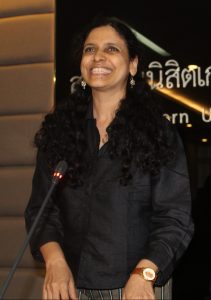
Anita Gurumurthy
Session 8 was facilitated by Anita Gurumurthy from IT for Change. Participants were divided into groups and asked to fill the following template:
We live in a world where…
Therefore, to put digital power and resources in the hands of the people, …
The different agendas that groups drafted are below.
 Group 1
Group 1
We live in a world where…
Therefore, to put digital power and resources in the hands of the people, we need…
• Local and global legislation (prohibit sector concentration).
• Education for good governance.
• Promotion of local alternatives (against sector concentration).
• Digital power and sharing of data (at macro legislative levels).
• Data sovereignty and sharing of data (at micro implementation and project levels).
• Decentralize digital infrastructure and access as a public good.
• Alliances across movements to come up with new solutions (to new problems)
Group 2
We live in a world where…
• There is a lot of marginalization of women.
• Wealth and power are concentrated among a few entities who control and commodify the world’s data.
• Data is being collected, stored and used without regard to our right to our data. There are no rules in the digital world. Rule of law is replaced with the rule of the powerful.
• There is a reduction of everything to digital data that erode our rights.
• The infrastructure of digital domain/spaces is not public and transparent.
Therefore, to put digital power and resources in the hands of the people…
• No use of digital data should undermine or erode the rights framework, including new rights in the digital world.
• Assert this vision/principle as the basis for ongoing global and national policy deliberations, i.e., Convention on Biological Diversity, Seed Treaty, etc.
• Development of digital technology should ensure the survival of the planet by preventing over extraction of resources.
• Establishment of mechanisms for societal understanding and evaluation of the current and potential impacts of digitalization.
• Stall trade agreements that reinforce the current corporate control of digital data and resources and ensure that impacted peoples are heard in deliberations.
• Proactively nurturing and building bridges with all critical social justice actors with digital/technology actors.
Group 3
We live in a world…
• Of a democratic crisis and a potentially irrelevant majority of people – where conservative ideas co-opt people’s anxieties.
• Where data is used to perpetuate inequalities, inside and between nations with creation of transnational monopolies.
• Where data is socially generated and privately expropriated and AI has been envisaged only as extractivism; where the harvesting is done without informed consent of the producers.
• Where physical extractivism has become invisible and data economy is causing environmental destruction, cultural erosion, with commodification of personal space.
• Of digital solutionism – where digital is envisaged as solution for all social and technical problems.
Therefore, to put digital power and resources in the hands of the people…
• It must be understood that the rights to enjoy the results of the innovation is already a human right.
• Production should take place in an emancipatory fashion, placing citizens before companies, sustainability before narrow profit and responsibility before tech-feasibility (precautionary principle).
• Digital ecosystem should be in the hands of the public, not privately owned.
• The role of people’s sovereignty has to become more pronounced with democratic oversight of data production, processing and use.
• New forward-looking digital culture – a new futurism, big vision for the future.
• Opportunity in times of crisis – take full advantage of the collapse of trust in liberal democracy and technology to radically shift the model.
• Mainstreaming of AI production, outside the corporate sector, not for profit, but to help people.
• Democratize technical innovation – socialize the data centers and the benefits of technologies, via incentives for those who contribute to public goods (tech coops).
• We need to politicize scientists and the AI process. We need to unionize the tech workers. Grey economy of technology, make visible invisible tech workers.
• Deepen – radicalize – open access and free knowledge policies and mandates – focused on we, the collectives. Thinking of “free” means thinking of “we” – expanding the commons in the digital world.
• Demystify the narrative of entrepreneurship, visiblize that it is not freedom but exploitation and visiblize the left-outs of digitalization.
• Taxes should be applied to each layer of exploitation in the digital economy to achieve social appropriation of the tech advantages with local control of revenues.
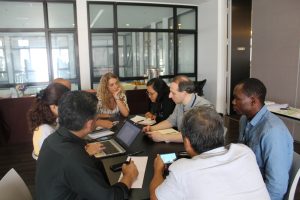 Group 4
Group 4
We live in a world…
• Of structures that are increasing corporate concentration leading to inequality.
• Of injustice and increasing vulnerability of the poor.
• Where people are sorted and left out to ensure power for the few.
• Where global rules are made for the rich and powerful.
Therefore, to put digital power and resources in the hands of the people, we need to…
• Defeat global digital trade rules in their current state, and address neoliberalism at the national level: by enforcing existing rules, adapting existing rules to the digital economy; through equitable distribution; through collectivization, including not just unions but citizen collectives.
• Address market failures under the capitalist system, such as monopolies arising from externalities and network effects, and the unsustainability of the financialized system.
• Develop alternative models of innovation, production, and ownership at the local, regional, and national level.
• Reclaim data as a public good; while recognizing the notion of public as problematized and open to appropriation. Examples of methods are the cooperative approach, inclusion of interactive experts, localized approaches; all supported and/or financed by state resources.
• Promote humanist approaches to education & knowledge.
• Ensure that calls and commitments to ethics such as for/in AI cannot and should not replace fundamental human rights. They must enforce, uphold and defend such rights.
• Ensure that open standards and systems should not be (must no longer be) appropriated and monetized, and finally monopolized.
• Renegotiate the use of language, terms such as the ‘public’ are used to homogenize, in their current form.
Group 5
We live in a world where…
• Data is a significant economic resource, where corporate power is controlling our lives, multiplying systemic and structural inequalities people face within and across countries, and often dismantling productive sectors.
• Digitalization is used by corporations for capturing commons, evading paying taxes, and controlling governments. The line between governments and the private sector is blurred through systemic privatization of public services (health, education, water, energy, transport, tele-communications). Communication has turned from a right to a private service; profits come before rights.
• ‘Digital solutions’ are provided as a panacea and pushed through trade rules shrinking the policy space of governments.
Therefore, to put digital power and resources in the hands of the people…
• Digital should serve humanity and be a tool for achieving development justice for the people, the planet, and for prosperity.
• Digital should not be for pushing ‘mere growth’, but a tool for reducing socio-economic inequalities, ensuring redistribution.
• Digital should be a public good and data should be owned and controlled by people for people.
• Demand preservation of democratic governance over the digital space; opposing binding international trade agreements that restrict policy space and occupy the digital power of the people.
• Adopt critical thinking on digital solutions; community ownership of data; communitize data resources and localize data governance.
• Enhance inclusive, participatory, and transparent democratic decision-making processes. Decentralization of the digital spaces can be used as a tool to ensure this.
• Through common but differentiating responsibilities, turn communications into commons.
• Corporations must contribute to the fiscal base of the societies where their corporate activities take place through development of unitary taxation systems.
Group 6
We live in a world where…
• Technology has a potential for human emancipation. That potential is being stifled.
• Digitalization is leading to loss of agency. At the individual level, we are witnessing a commodification of people’s identities and behaviour. Privacy is being compromised and surveillance is rampant. Misinformation and election rigging are disenfranchising the individual.
• Producers are also losing agency. Robotic farms and the automation of factory labor are leading to social unrest. Everything is being platformized and is open to digital control by Silicon Valley.
• Nations are also losing agency through loss of democratic, sovereign governance systems. We are moving towards counterfeit democracies; states are losing taxes and this is hurting public interest; sovereignty is lost to global corporate centers.
• The ability to regulate the digital is being taken away permanently. Countries are being locked in at the international level, using forums like WTO.
• Non- transparent and unaccountable systems are exacerbating existing inequalities.
• There are implications for ecology and the environment, and all this is accentuating the issues of globalization, leading to geo-political instability.
Therefore, to put digital power and resources in the hands of the people, we need…
• Some short term goals: stop e-commerce negotiations and shape alternative narratives.
• Breaking up digital monopolies as an instrument to achieve our goal of democratizing technology. Separate platform and content control.
• To democratize and make digital infrastructure, like the internet, public.
• Data governed in the public interest: some the data should be a public/common good, some community or producer owned, some self-governed or user-governed.
• To create alternative platforms built on social justice.
• Democratic regulation of AI in public interest.
What should we do together, and how?
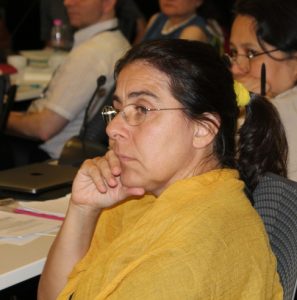
Beatriz Busaniche
Session 9 was facilitated by Beatriz Busaniche from Fundacion Via Libre and Cedric Leterme from CETRI. Participants focused on ‘process issues’: how to work together as a group, how traditional movements and actors can interact with digital actors, their respective roles/responsibilities, collaboration platforms, standing working groups, advocacy and media strategies, and so on.
The following is a summary of the methods and actions identified in this session:
1. There should be a smaller group that will develop the digital justice manifesto, that can then be adopted by the larger group.
2. There should be a communications task force within the group, to handle messaging and outreach.
3. Likewise, there should be a financial task force to raise and manage resources for the group.
4. We should produce 2 page long explainers on specific issues.
5. We should organize and use workshops, webinars, databases, and translation tools.
Break out groups on process
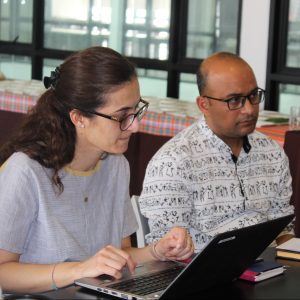
Bihter Moschini
Session 10 was facilitated by Bihter Moschini from the Arab Network of NGOs for Development. Participants were divided into groups that discussed concrete ideas about process, taking off from the previous session. The main outcomes from each group are below.
Group 1
• Every group and network can share key forums/meetings that they feel will be useful for the coalition to connect to.
• Member organizations may run a series of webinars, convening action to bring up to date, about, trade agreements and e-commerce.
• Meetings to respond to the plurilateral e-commerce process at the WTO, and on digitalization and labor movements.
• Engagement with the Internet Governance Forum, WTO Public Forum, and UNCTAD e-commerce week. Our engagement with forums should be beyond confrontation so that we are not always in a “house is burning” mode. We need to be able to showcase that we are willing and able to be proactive – it is not only about saying the neoliberal vision is wrong. We should be able to show viable alternatives to the dominant digital trade agenda (for eg. internet and data as a public good).
• There need to be specific subcommittees of different people in the group, taking on specific strategic areas in detail (e.g., for data governance, Big Tech tracking, labor issues, developing alternative technologies and different models etc).
• The coordinating group should be able to ensure that issues are not just framed from the entry point of the digital and data, but are framed in a language that is accessible to these different constituencies
Group 2
• A Universal Digital Justice Repository can be built. We can map actors, positions of governments, and topics relevant to the struggle.
• Assist collectively, locally, and universally to engage, to start with, at least two massive movements, for example, organized labor and women.
• Create simple sectoral papers on the negative impact and potential harm of corporatizing digitalization and the alternatives.
• Find allies among the businesses affected by e-commerce.
• Areas of engagement can include: trade agreements, workers of global platforms, national legislations, IPRs, and climate networks.
• Means of engagement can include: exploring popular approaches to engage people, informing key actors, research, media strategies, and engaging governments, especially around their concerns.
• Bring the notion of data to movements and develop bridges between traditional movements and digital activism. Dialogue across movements and identify other networks for multiplier effects.
• Share case studies of negative experiences of different countries as digitalization takes place in an unregulated manner.
Group 3
• The group needs an identity, organizational principles, and narrative. It needs a positioning statement and organizational principles related to social justice and equality; we need to form a core which is committed to such a statement.
• We need innovative communications methods. Identify urgent to-dos, prioritize and prepare an action plan.
• We need regional formations and regional meetings based on common principles, such that we have local flavor and take up localized debates.
• We need to develop and maintain relationships between groups on digital actors and non-digital actors.
• We need sector-based or thematic sub groups, and sectoral coordinators (two focal points) who can become an interface between the umbrella organizations and sectoral actors. It should be a standing arrangement and not a transitional arrangement. Likewise, we should have regional sub-groups.
• Wherever there are existing networks, integration with them may be explored.
• We need a deliberative approach for information sharing, and occasional writing.
• Represent Just Net Coalition in international forums (like agricultural workers’ forums or street vendors forums) for dissemination of JNC’s vision and for networking. Identify other spaces for advocacy.
• We should develop a mechanism for completion of our unfinished debates here.
Group 4
• We can achieve our goals through organizing and communication; outreach; a repository of policies; using alternative platforms; engaging in different languages; integrating existing resources.
• We can host hackathons for producing tangible results.
• Actionable data / information: we need a centralized database of who we are, other organizations, and activities happening, accessible to all members. We cannot be in clusters or avoid sharing of information for competition reasons. We need to share contacts for cooperation, reach the grassroots, get funding and do lobbying, develop calendars, and produce materials (especially entry/on-boarding materials/tool-kits, to help new organizations in catching up).
• We need to develop frameworks / best practices on how to engage with big tech sector / government.
• We should develop a communication strategy: how-tos, language to use, a social media practice (e.g.: 60 seconds videos). We need to reach the grassroots.
• We should consider narrowing down to some subjects (data for example) which concern all of us.
• We need a process for organizing from the local to the global for events (doing local organization, consultations, grassroots, and meeting again after having undertaken such mobilization).
Group 5
• We can organize different workshops on economics, technology, and democratic governance, with regard to the digital arena in addition to sectoral workshops.
• We can make a database of local actors, successful local and national initiatives and resources.
• We should identify key messages for new communities and make broadcast tools. We should be conscious of accessibility and translation.
• We should map existing platforms/discussion spaces/fora.
• We should resist appropriation, and build bridges to allies who have the social capital to meaningfully resist the neoliberal onslaught.
• We should engage with technologists, political parties, and academics.
Group 6
• Continue to utilize remote engagement within the group (recognize inherent challenges and adopt measures to overcome). Use means to address inherent barriers for participation (acknowledge infrastructure limitations, consider linguistic barriers, time differences, invisible marginalization, etc.).
• Establish task forces across sectors/themes/regions. Coordinate the working of the task forces, and organize virtual engagements based on these themes and commitments.
• Learning and cross-fertilization of ideas/experiences from across sectors and themes.
• Teaching webinars: not one-off and not aiming at numbers, but follows a curriculum where participants commit to learn from and contribute to them. Another idea is a problem-cracking webinar where different sectors come together to identify problems and think out of the box.
• Mapping out different channels of disseminating information in our regions/sectors for promoting the digital justice agenda.
• Repository of best practices and policies (complemented by blog posts) along with their rationale. This will go a long way towards building a knowledge hub. Also, build a repository of researches and resources generated from different partners/sectors.
• Communicating our messages and positions to the world: increase the visibility of messages; simplify our messages and language. Communicate global issues by linking to local/personal experiences. For this, form a Communications Task Force.
Charting the way forward
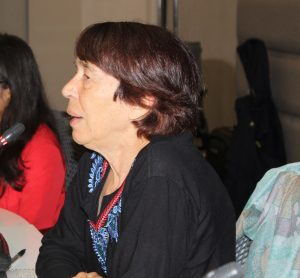
Sally Burch
Session 11 was the closing session. It was facilitated by Sally Burch from Agencia Latinoamericana de Información (ALAI) and Gurumurthy Kasinathan from IT for Change. Concrete commitments were made by participants.
Some of the commitments made are as below:
Name | Commitment |
Renata Avila | Design and aesthetics in communications; a piece on digital colonialism. |
Jean F Queralt | CRM, repository; engage coders; organize hackathons; sharing data with care; represent coalition in events. |
Beatriz Busaniche | Communications task force, Latin America regional coordination, network with traditional social sector actors. |
Richard Hill | Writing papers and helping with workshops. Represent coalition partners in Geneva events. Help with manifesto and governance structures. |
Burcu Kilic | Share digital trade repository (under development). Communicate our work and messages to wider public (simply, clearly). Communications task force. Topics related to digital trade, and the US. |
Kate Lappin | Collaborative research on e-commerce impact on public service workers, will explore ‘public goods’ approach to data. Help public sector unions to understand this area. Regional networking. |
Olisias Gultom | Assistance on trade issues and issues related to Indonesia. Make issues clearer to wider audiences. |
Roshan Pokharel | Translate manifesto to Nepali. |
Adriana Foronda | Support for webinars. Outreach in Latin America. Translate manifesto to Spanish. |
Duncan McCann | Support for the manifesto. Writing 2 pagers/policy briefs. Writing on data economy. Case studies of alternatives that work, like platform and data cooperatives. |
Georgios Altintzis | Organize an ITUC e-commerce conference. Reflect the digital justice agenda in their work. |
Ansgar Koene | Communicate the digital justice agenda to the engineering community. Provide engineering services for the digital justice agenda. |
Edgardo Legaspi | Deepen Focus’s understanding and links to the digital economy. Systematically help the network connect to movements fighting for alternatives, to disseminate the digital justice agenda. Assist with communications work. |
Elenita Dano (Neth) | Share their webinar series that takes place every 6 weeks. Share publications, papers. Use spaces they engage with to share key digital justice agenda positions. Network to add allies to the group. |
Fabien Anthony | Regional coordination in Africa. Help with communication/social media strategy. |
Arthur Gwagwa | Regional coordination in Africa. Writing a paper on the geo-politics of AI. Provide a link between the work in UK and Africa. |
Munu Martin Luther | Write papers and policy briefs. Share information on best practices. |
Roland Kulke | Represent the coalition at events in Europe. |
Cedric Leterme | 2 pager on labor and digitalization. Regional coordination in Europe. |
Bihter Moschini | Regional coordination for the Arab region. Organize workshops in the region through their network. |
Kartini Samon | Collaboration with APC on AI and agriculture (by November). Regional discussions on trade. |
Ashraf Patel | Engage with South Africa G20 processes on ICT and industrialization, taxation, etc. Include inputs from civil society and labor. Writing on copyright and access to knowledge. Collate inputs from the digital justice agenda for South and East African nations grappling with social media tax. |
Nanjira Sambuli | Be a space shifter – play multiple roles in different fora, linker – for people from different professional and geographical backgrounds. |
Mohammed Abdul Haque Anu | Writing and engagement on digital trade. Help with finance task force. |
Sean O’Siochru | Writing papers on media, ICT and education, etc. Help with the manifesto and governance. |
Ana Celestial | Web hosting services. Organize a webinar on technology issues. Reach out to academics. Provide inputs on privacy regulation of technology. Network with personalities in Asia-Pacific to further our goals. Regional CSO engagement, including a working group on digitalization. Help with writing the manifesto. |
Anupam Guha | Create a database of technology activists. Help with the manifesto. Help with the communications task force. Amplify digital justice agenda messages through social media and papers. Represent the digital justice agenda in events. Help with AI webinars. |
Deborah James | Organize webinars on trade. Create an introductory handbook on digital trade. Engagement with WTO and public forums; represent in UNCTAD interactions. Distribute material to governments on digital MSMEs, agriculture, and gender. Work with technology activists to enrich understanding of digital trade. |
Mariana Valente | Help with governance structure. Help with manifesto and translating it into Portuguese. Connect the digital justice agenda to their current networks. |
Jane Kelsey | Share research reports. Conduct research on taxation issues. Work with governments that require support and information on digital trade. |
